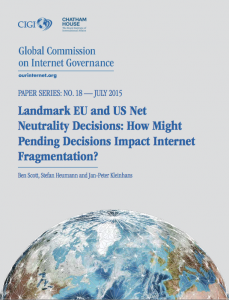
After more than 40 years of operation, DTVE is closing its doors and our website will no longer be updated daily. Thank you for all of your support.
EU-US net neutrality divergence ‘could impact competitiveness’
 A significant divergence of neutrality rules in the US and the European Union could impact on the EU’s competitiveness with US internet industries, according to a new report.
A significant divergence of neutrality rules in the US and the European Union could impact on the EU’s competitiveness with US internet industries, according to a new report.
The Global Commission on Internet Governance (GCIG) study, looking at how pending decisions could impact internet fragmentation, claims that a major difference in net neutrality rules could increase barriers of market entry for new EU start-ups looking to challenge Silicon Valley tech giants.
It also warned that a “weak net neutrality rule” in Europe could lead to a divergence of web customer experience between the US and EU, and that “discriminatory interconnection practices” could be used to undermine the global marketplace of web information and services.
“The net neutrality debate is much more than an arcane technology policy decision for communications regulators. The choices that nations make will determine not only the architecture and market structure of their own information systems – including mass media, digital commerce and personal communications – it will also determine whether the global internet will remain an information commons or fracture into a set of national or regional political economies,” said the report.
“For years, the United States and the European Union have discussed, studied and debated the issues involved in net neutrality. The United States began the process a decade ago with very weak intentions to protect net neutrality — but ended this year with a very strong net neutrality rule. The European Union began the process with strong intentions to protect net neutrality. After periods of debate that moved away from this standard, EU policy makers have concluded with a rule similar to the United States, but with some lingering ambiguity that may yet result in scenarios of divergence.
“The implications for the transatlantic digital marketplace are significant and could lead to different forms of regional fragmentation.”
Two independent global think tanks – CIGI and Chatham House – established GCIG in January 2014 to “articulate and advance a strategic vision for the future internet governance”.


